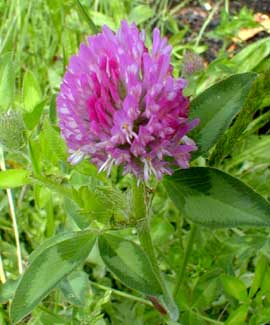
Sweet Purple Clover
"To make a prairie it takes a clover & one bee."
Emily Dickinson
(1830-1886)
(1830-1886)
Purple clover, aka red clover or sweet clover (Trifolium pratense frequently mispelled T. pretense), goes by many other common names, including: Trefoil, Beebread, Cow-grass, Peavine Clover, Meadow Clover, Wild Clover, Broadleafed Clover, Honeysuckle Clover, Cleaver Grass, & Marl Grass.
It is an omnipresent biennial or shortlived perennial, found all around Puget Sound. This the largest of the clovers that appear everywhere (the smallest is T. dubium or Hops Clover). Sweet Clover is not originally a native plant but originated in Europe. It is now distributed all around the globe.
Some gardeners struggle against it as a weed; others welcome it as an excellent plant for setting nitrogen in pore soil, brightening up dismal ungardened areas, attracting pollinators that the whole garden benifits by, & providing beautiful flowers even for bouquets. It is a most desirable clover for beekeepers, & clover honey is among the best of honeys.
It's greatly liked by cattle, or by pet rabbits, & the flowers & youngest tender leaves are even regarded as comestible in human salads, or used at least as an attractive garnish have occasionally been called Honeysuckles. A vegetable bullion can be made from equal portions red clover, chicory, onion, & chives.
The name clover derives from clave trinodis which was the name of Heracles' warclub, made from tree with three large roots. This is also why the clover-shape on playing cards are called "clubs." The trio of leaves reminded others of the Christian system of Three Gods. Clover came to be widely used medicinally not because it had any real effect on anything in particular, but because it was believed to have a direct connection to healing powers of the Holy Trinity.
As with many "lead into gold" herbal scams, dried purple clover or purple clover extract or even clover sprouts are being widely marketed as a post-menopausal medicine, on the theory that its isoflavines mimic human estrogens, though it does not actually do so. Clover is used for many other things it does not actually have any effect on, but in recent years its use as a post-menopausal remedy for the boomer generation entering its dotage has become a veritable mania.
A double-blind controlled study undertaken at the George Washington University School of Medicine, Washington, D.C., results published in the journal Menopause September-October, 2001, compared the effects of T. pratense to the effects of a placebo for treatment of menopausal symptoms. The trials were very clear that there was no effect whatsoever on any menopausal symptoms. None whatsoever.
Yet there are vested interests who will swear on stack of bank receipts that "most studies prove" what they do not prove, that clover can reduce hot flashes.
Another large controlled study conducted by Dr Jeffrey Trice of the University of California in San Francisco, published in the Journal of the American Medical Association in July 2003, again found that women treated with placebo & treated with herbal remedies reported the exact same degree of reduction in their hot flashes. Dr. Trice said the findings were a great disappointment, because "Doctors & particularly women are looking for alternatives to hormone therapy." Clover, alas, is not even close to being the answer.
Here's how the vendors, manufacturers, & quack pop-book authors like Dr. Ray Sahelian, are able to tell such amazing whoppers with such poker faces. The goal is to insure that sales of useless food supplements persist; & because it is illegal in the USA to state on the label on the product is actually good for anything, the second important thing is to insure sales of free-press lie-their-asses-off books that explain in detail why clover is the perfect remedy for things it cannot actually treat. There's a selective way of viewing even studies like those at the University of California & George Washington University which alas show that placebo & clover have the exact value in providing comfort.
Without reference to the placebo, the important factor becomes this: women reported relief. Therefore it works! Never mind they could've gotten the same relief from sucking on a rock or juggling hackysacks. The arguments in favor don't even have to be convincing, because there is no one so willing to risk injury to their health as a health nut whose ability to reason is completely overwhelmed by an absolute need to believe in magic no matter how unconvincingly it is veiled as medicine.
The coumarins in clover inhibit blood clotting, which not inconceivably could have a real medicinal value apart from what it is generally used for instead. Unfortunately, this also means it is a very unwise herb to injest willynilly on the say-so of some herbal quackpot or barely employable shelf-stocker in a misnomered health food store. Though largely a harmless food supplement for herbal hypocondriacs to play with, the risk of hemorrhagic side effect does exist.